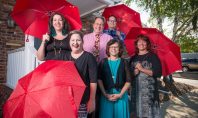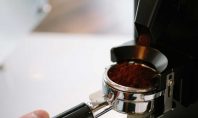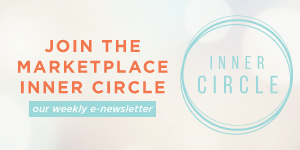When It’s Cancer
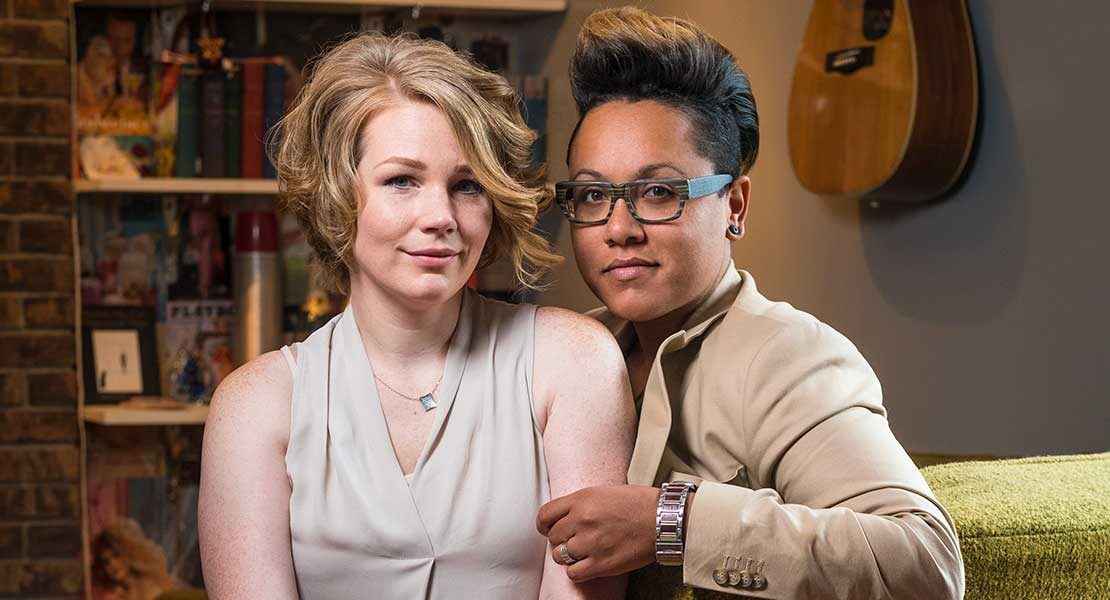
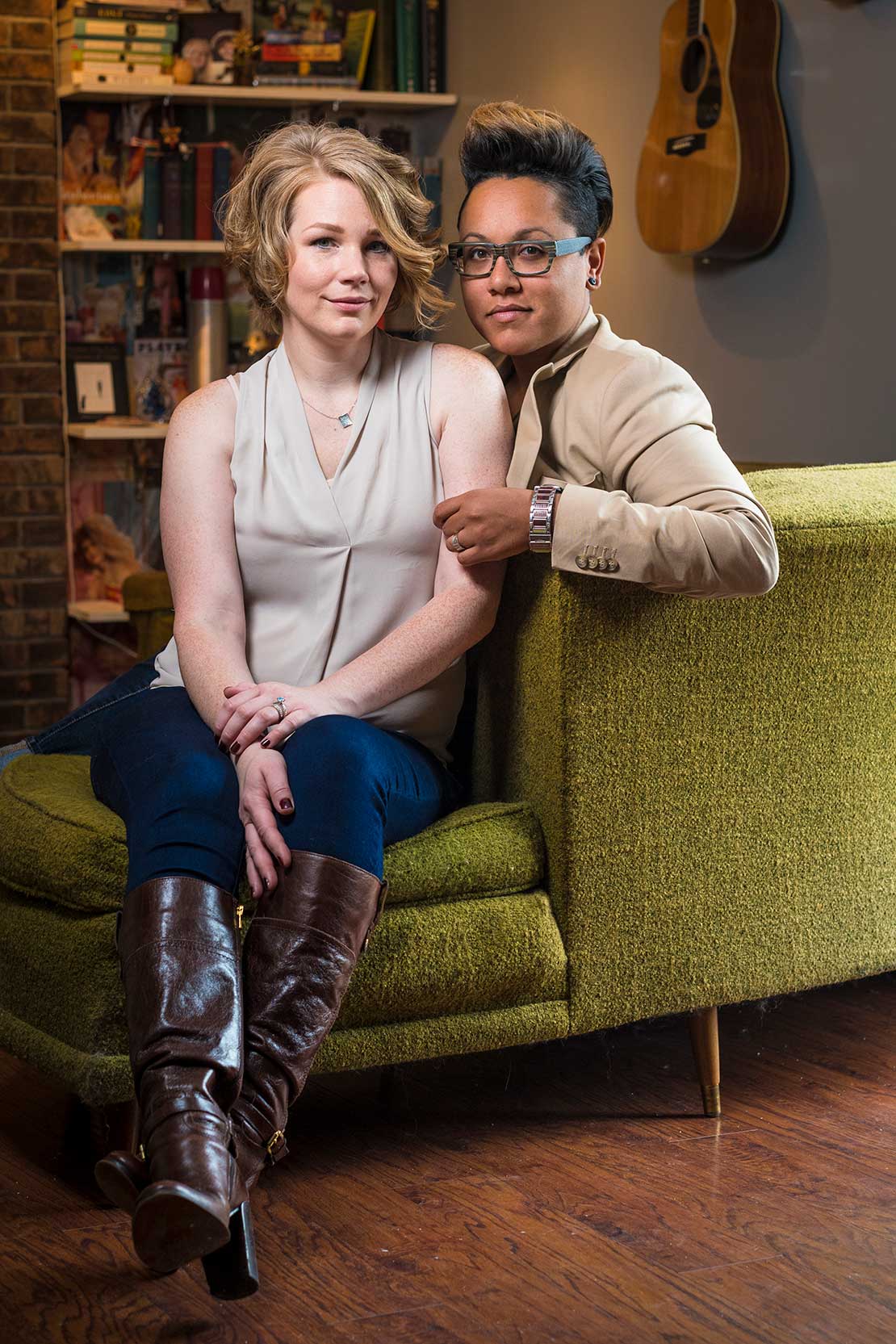 Eighty-seven. Thirty-one. Two.
Eighty-seven. Thirty-one. Two.
These are numbers Sarah Trimmer is well acquainted with. The first is the percentage of likelihood a woman will develop breast cancer due to mutated breast cancer susceptibility genes. Thirty-one represents how old Sarah was when she found out the matriarchs in her family carry the faulty genes. And two is how many times Sarah has survived breast cancer since 2012.
Sarah’s mother, grandmother, and aunt had all been diagnosed with cancer when a family doctor suggested the disease could be genetic. Sarah, then 31, underwent tests and discovered the cell mutations. A mammogram followed and masses were found in her breast tissue. Sarah scheduled a preventative double mastectomy. Less than three years after surgery, she found a lump in the center of her chest. At 34, Sarah had a lumpectomy, chemotherapy, and radiation.
“I knew it wasn’t there shortly before that,” Sarah says about the growth. “With my first bout of cancer, we did surgery and I was done. We didn’t do any treatment because we caught it so early. I needed a lot more support with my second bout.”
Don’t be afraid to ask, “Do you want to talk about cancer today, or something else?”
Sarah explains that when you’re diagnosed, you need to identify who your support system is going to be and “assemble your army.” With her friends and her wife, Sarah Kirk, by her side, the cancer was defeated.
Sarah, now 36, recalls the most helpful acts and offerings her army provided through treatment and recovery.
“The reaction of everyone is to say, ‘let me know if you need anything,’ which is great, but it puts ownership on the sick person to reach out,” she says. “You’re already handling a lot of decisions.”
Rather than leave an offer open-ended and without specificity, Sarah suggests friends and family members can identify a precise need and address it. For example, offer to mow the lawn, rake leaves, or shovel snow. Ask if you can drop-off a homemade meal during the week.
Sarah remembers one day in particular during chemo when she wanted to be alone at home. A friend called and explained she was doing groceries and asked what Sarah needed, emphasizing the shopping was no trouble because she was already at the store to pick-up her own necessities. She offered to let herself into Sarah’s house, put the food away in the kitchen, and leave. She was like a stealth grocery ninja and it was exactly what Sarah needed.
If covert errands aren’t your style, patients always appreciate transportation to and from chemo, dog walking, and house cleaning. Above all, though, Sarah says time is the best gift. A patient may not be able to go for a hike, but they can definitely Netflix and chill. They still want to hear about your crappy day and be your friend.
“Just because you have cancer doesn’t mean you don’t want to be part of the conversation,” Sarah says.
Her sense of humor clearly intact, Sarah urges people to refrain from comments like “My grandmother died from that,” when you learn of someone’s diagnosis.
And step away from your search engine—this is not the time to mention miraculous antidotes. “I can’t tell you how many articles I received about lemons curing cancer,” Sarah says with a chuckle.
During treatments, friends would flock to Sarah to ask how she was feeling and wanted to know what the doctors had to say about her recovery. Sarah felt like her wife was ignored.
“She was going through all this stuff and no one thought to ask about her emotions,” she explains. “Acknowledge the person who is supporting the person going through treatment.”
Healthy spouses and partners nobly pick up the slack at home while they absorb medical bills, show up to work each day, and offer around-the-clock physical and emotional support as their loved one perseveres through chemo. Not that they’re expecting it, but these efforts are made largely without any outside sympathy or support.
Kirk was eager to look after her wife, but was not immune to the invisibility cloak caretakers often inherit. When she was out by herself and ran into friends, the conversation immediately turned toward concern for Sarah. “No one asks how you’re doing anymore,” Kirk says. “It’s hard, but it’s temporary.”
When faced with Sarah’s illness, Kirk soon realized her own attitude was the key to getting them both through the experience. She decided to stay upbeat and focus on highlights rather than succumb to sadness. “Try to find your peace,” advises Kirk to other caretakers. “Try to find that light to keep you positive. The results will come out better. Holding on to that positivity is really key.”
Kirk ingrained herself in Sarah’s physical healing. Doctors encourage spouses to see their wives undressed after double mastectomies to ensure they face the situation as a team and maintain a solid bond. Following Sarah’s surgery, Kirk jumped in to assist with drains, bandages, and bathing. “I was eager to help,” she says. “I think being eager and not shying away or being freaked out helps on an emotional level, too. My big goal was to show support even when it sucked and I was terrified.”
Outside the home, Sarah found a network through Cancer Support Community of the Greater Lehigh Valley. Through the organization’s programs, she could participate in activities like yoga and jewelry-making classes with other young cancer survivors. Sarah says CSC has a resource for anything a cancer patient could imagine needing. To give back, she helped establish Beards for Breasts, a fundraising event in which men’s beards are auctioned-off and the highest bidder gets to shave a face full of whiskers. If you have a goatee to donate or an urge to shave someone else’s, Beards for Breasts will take place at Pearly Baker’s Alehouse on October 17. All proceeds are donated to CSC.
Sarah will emcee the event, happy to support a community that embraced her. “She wants to try to help other people going through this,” Kirk says. “Especially other young women.”
October is Breast Cancer Awareness month. If you have a family history of breast cancer or if you are 40 years of age or older, speak to your doctor about preventative options and screening. If you or someone you love has breast cancer, reach out for local support through the Cancer Support Community of the Greater Lehigh Valley at cancersupportglv.org.




